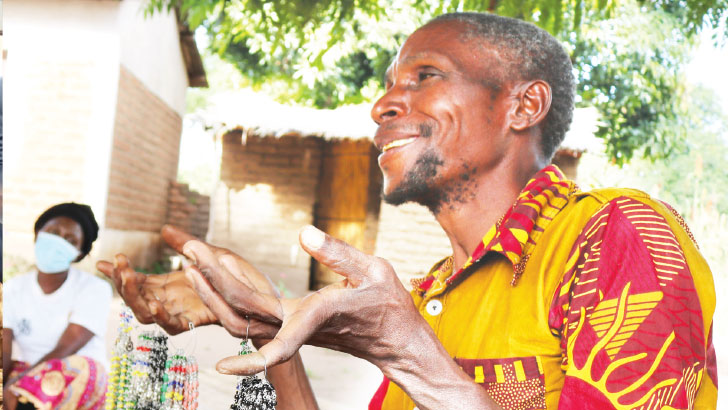Muslim finds gold in rosaries
Adaki Kimamu is a Muslim of interest for Catholics in Balaka and surrounding districts.
The 55-year-old man with disability fashions rosaries, the symbol of the crucifixion of Jesus Christ.
Every day, Catholics visit his home in group village Nsamala, Balaka, to buy the rosaries they wear around their necks as weapons for prayer against trials, temptations and tribulations.
“I’m a staunch Muslim, but making rosaries is my way of life. I learnt this skill from Father John Rosa, an Italian priest who brought me up at Kankao Parish from 1975,” he says, selecting beads for a rosary in the making.
Kimamu quit school in Standard Five, honed business skills while selling secondhand clothes around the parish.
He believes disability is not inability.

“I was just two years old when I survived polio with a paralysed left leg, but this doesn’t stop me using my remaining limbs to uplift myself,” he states.
Using a walking stick, Kimamu walks the talk as he puts his skills to good use.
The rosaries of different colours implore onlookers to focus on his abilities. They personify triumph over adversity.
Displaying a bunch ready for sale, he releases his pent-up belief: “I am a human being like any other. I have aspirations in life, a family to feed and two hands I use to my benefit.
“Persons with disability can perform wonders given access to business capital.”
His business received a boost last November when Eagles Relief gave him K112 000 in a gender responsive initiative to lift the poorest of the poor from poverty. The initiative funded by Financial Access for Rural Markets Smallholder and Enterprise (Farmse) through Oxfam Malawi and Christian Aid targets 3 300 poor households in Balaka and Machinga.
Oxfam and Christian Aid are implementing the project in partnership with Eagles Relief in Balaka and Churches Action in Relief and Development (Card) in Machinga. The eastern districts have some of the highest levels of poverty, according to the National Statistical Office.
Kimamu says the future looks bright.
“When I received the first half, I invested some in a grocery in my homestead which generates enough money for my daily needs and the remainder in buying farm inputs and materials I use to make rosaries for sale,” he says.
The father-of-five had an early Christmas last December when he sold the first batch of rosaries at K70 000.
“With the earnings, I bought food for my family during the lean season, ducks that I could sell in tough times and fertiliser which I mixed with poultry droppings to boost maize yield in my barren field,” he explains.
The family also paid school fees for their son who learns in Mzuzu, almost 600 kilometres northwards.
He has taught all his children to make rosaries, building a family legacy as producers of the prayer tool many Catholics import.
“The financial support from Farmse was distributed to help the ultra-poor to graduate from poverty. The family in Nsamala, like all recipients, has been receiving monthly cash transfers for years.
However, the struggle to end poverty persisted as crop yields were falling due to climate change and degraded soils,” says Evelyn Mkandawire, from Eagles Relief.
Daud Kayisi, communications manager for Oxfam in Malawi, is happy that people who were stuck in abject poverty can afford nutritious food, build decent houses, send children to school and acquire other vital assets.
He explains: “The most unique aspect of this initiative is that people are not being given fish, but being taught how to fish.
“The people who have been receiving cash transfers from government for years were given tips on how to put money to profitable use as well as how to save and access business loans. We are happy that some have not only become self-sufficient but they are acquiring assets they could only dream about.”
Kimamu is a member of a village savings and loans group, where he gets business loans and tips to grow his enterprise.
He says: “The proceeds of rosaries have become handy because my family rarey harvested enough food to take us to the next harvest.
“Now we make enough money to buy food and other basics.”
For Mkandawire, this mirrors a rise of many vulnerable households in the district where 61 in every 100 people are poor and a quarter of the population ultra-poor.
The beneficiaries are in line to receive a second instalment of K112 000 each.
Seen cutting and bending wires with a pair of pliers, inserting them into the eyes of beads of different colours and fitting crosses and joints, Kimamu cannot wait.
“I used much of the first instalment to buy crosses, beads and wires for making rosaries. The second instalment will help me grow my business. There is no reason why Malawians should be wearing imported rosaries when my children and I can make them here,” he says.
The business has made Kimamu a darling of many priests in the Eastern Region.
He sells rosaries at K500 each on retail and K350 on wholesale.





